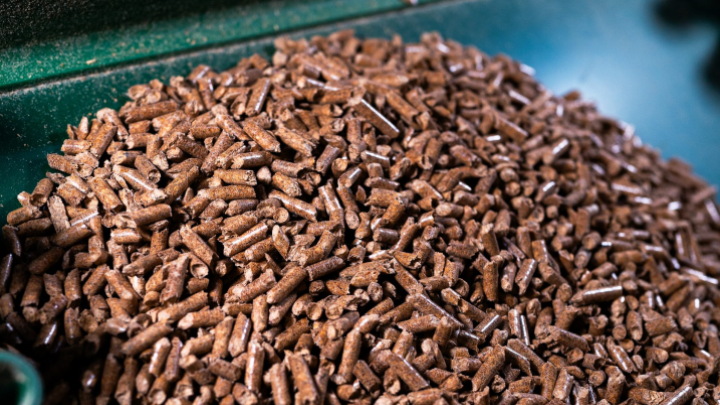
What is Pellet?
Pellet is a cylindrical, high-density fuel produced from biomass, one of the renewable energy sources. It is primarily made by processing compressed wood shavings, agricultural residues, and other biological materials. The production process involves recycling waste materials into an environmentally beneficial energy source.
One of the most notable features of pellets is their high energy efficiency. Their high density means they occupy less space compared to other biomass fuels and provide more heat during combustion. Additionally, since no additives are used during production, they are a completely natural energy source. This makes them stand out as both an environmentally friendly and economical option.
Widely used in European countries, pellets offer a sustainable solution for meeting energy needs in both individual and industrial applications.
Differences Between Pellets and Other Fuels
Compared to fossil fuels like coal, natural gas, and oil, pellets offer numerous environmental and economic advantages. For instance, while coal combustion releases significant carbon emissions that harm the environment, pellets, as a carbon-neutral fuel, do not damage the environment. This is because biomass materials absorb carbon from the atmosphere during growth, and this amount is released back during combustion, resulting in zero net carbon emissions.
Unlike fossil fuels, pellets are a renewable energy source, which is a critical difference, particularly in terms of energy independence and sustainability. Pellet fuel also has a very high energy efficiency. It contains 80-90% less moisture compared to traditional wood fuel, resulting in more energy being released during combustion.
Additionally, it offers logistical advantages. Its compact structure makes storage and transportation easier. Being producible from local resources without relying on large facilities, like fossil fuels, reduces energy costs and makes it more accessible.
Does Pellet Fuel Harm the Environment?
Pellet fuel is an energy source that minimizes environmental impacts. Since it is produced from biomass materials, it is considered a renewable fuel and, unlike fossil fuels, represents an unlimited resource. No chemical additives are used during its production, which results in an eco-friendly structure.
While pellets naturally release carbon during combustion, this carbon amount equals the carbon absorbed by biomass during growth, maintaining environmental balance. This characteristic makes pellet fuel a carbon-neutral option. Additionally, the ash content of pellets is very low and can be used as fertilizer in agriculture.
Unlike fossil fuels, pellet fuel significantly reduces the emission of harmful gases like sulfur oxides and nitrogen oxides. This prevents air pollution and contributes to a cleaner environment, especially in cities and industrial areas.
What are the Advantages of Pellets?
The advantages of using pellets distinguish them from other energy sources and make them a preferred choice in many areas. Here are the prominent advantages of pellets:
- High Energy Efficiency: Pellets have high energy density due to their compressed structure. Their low moisture content provides maximum heat with minimal fuel.
- Economical and Sustainable: Being producible from local resources reduces dependency on imported fuels and lowers energy costs. It is a cost-effective option in the long term.
- Environmentally Friendly: Compared to fossil fuels, pellets minimize carbon emissions. Their production and usage processes do not harm the environment.
- Easy Storage and Transportation: Pellets are compact and occupy minimal space. They have a low risk of deterioration during storage.
- Contribution to Local Economy: Pellet production allows for the utilization of agricultural and forestry residues, directly contributing to the local economy.
What are the Usage Areas of Pellets?
Pellet fuel has a wide range of applications, from households to industrial facilities. Its eco-friendly and efficient nature makes it a preferred choice in many areas:
- Home Heating Systems: Pellet stoves and boilers provide efficient heating in homes. Their low carbon emissions make them an environmentally friendly heating option.
- Industrial Facilities: Pellets used for energy production are preferred in industries due to their high energy efficiency and economic costs.
- Agricultural Sector: They serve as an effective energy source in agricultural drying processes and contribute to the utilization of agricultural residues.
- Electricity Production: Pellets used in thermal power plants support clean energy production by reducing carbon emissions.
- Public Spaces: Schools, hospitals, and public buildings use pellets as an eco-friendly and economical energy solution.
Pellets produced by Pelwood increase efficiency and performance in all these areas.
